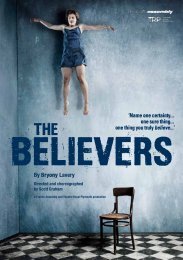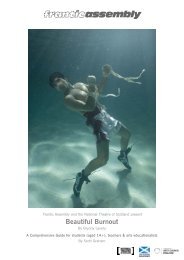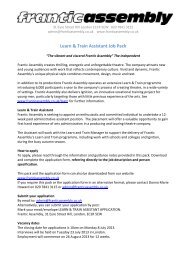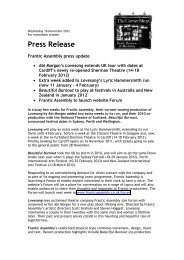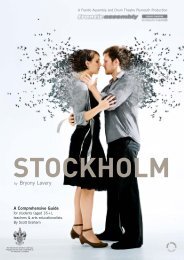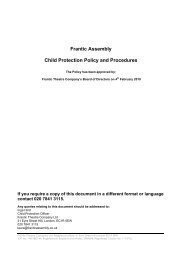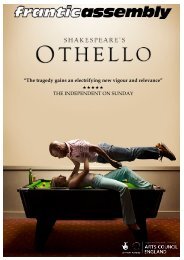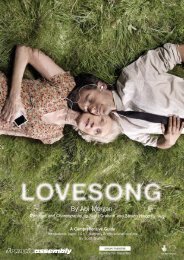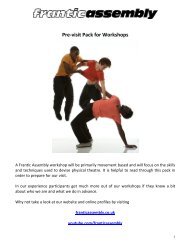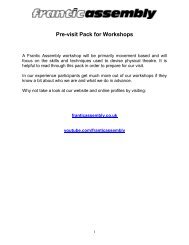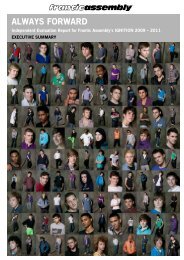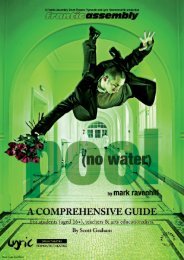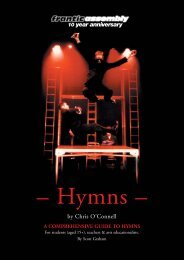Rabbit Resource Pack - Frantic Assembly
Rabbit Resource Pack - Frantic Assembly
Rabbit Resource Pack - Frantic Assembly
You also want an ePaper? Increase the reach of your titles
YUMPU automatically turns print PDFs into web optimized ePapers that Google loves.
CHAPTER 1 Starting points - Overview - The Play<br />
THE FAMILY<br />
<strong>Rabbit</strong> is about the clash of different worlds. Different spheres on a<br />
collision course.<br />
All families face generational conflict, misunderstandings and general<br />
dysfunction. The Cave family is no different.<br />
While here the younger generation possess a vibrancy, a passion, a<br />
sexual charge that appears lost in the elder generation, they also<br />
possess a naivety, a selfishness, a self righteous quality that can only<br />
present itself to an older, ‘wiser’ generation as folly. Been there, done<br />
that, bought the T-shirt.<br />
The older generation here can be accused of a cynicism, a direct<br />
denial of optimism, that strips the world of any form of hope. They<br />
are cold, ignorant of how the world has changed and how priorities<br />
have altered since their day.<br />
They would of course point out that this is a natural process of<br />
enlightenment to the true nature of the world that develops through<br />
age and experience and is denied to the idealistic over-simplistic (or is<br />
it overcomplicated?) world of their offspring.<br />
What is equally abhorrent to both generations is that one spawned<br />
the other and the mutation from one into the other over time is<br />
unavoidable. It is also a process of loss and acquisition. What Paul has<br />
gained in material worth and worldly knowledge he has lost in<br />
freedom and spontaneity.<br />
Paul<br />
Kate<br />
(about Madeline and Spin) Why were they scurrying?<br />
Paul, you’re not at work now. They were scurrying.<br />
We used to scurry. It’s not illegal. (p.29)<br />
The problem is that Paul and Madeline exist purely in their own worlds. They are the pilots of their spheres, shaping their<br />
own destinies. At least that is how it seems. What will shatter this illusion is the bombshell of Paul’s mortality and both<br />
enter a new phase of understanding. Their worlds are blown apart yet they are both united under the shadow of mortality.<br />
This is a natural and inevitable stage in life. One that causes us to reassess the way we choose to live and challenges the<br />
perceived roles of parents and children. Madeline challenges Paul’s dominance in the family but when Paul betrays his own<br />
fragility it tests her own willingness to grow up. If growing up is about death, who would want to grow up?<br />
Despite Madeline’s protests she is used to the material benefits she receives from her father<br />
Kate You should have respect for your father. He does a lot for you.<br />
Madeline He does it with money, Mum. Cars. Phones. Rent. Spin says: The more plastic parenting you receive the more<br />
you lack in such things as independence, self worth and - other things. dad has denied me my right to learn<br />
how to live in the real world<br />
Kate Well darling, why don’t you give back the money, hand over the car, return the phone, move out of the apartment?<br />
He’s not forcing them on you.<br />
Madeline I’ve adjusted. I’m conditioned now. I’d be lost without my things. (p.65)<br />
With her father strong, outspoken, larger than life, she has her clearly defined role in life. That of rebel, crusader for an<br />
alternative lifestyle. Ironically what she needs most of all is status quo. Her world relies upon the monster that is her father<br />
as master of his world, a world diametrically opposed to her own. This gives her a drive, a purpose, but ultimately, just like<br />
Spin, it gives her an excuse.<br />
Spin (about the death of his parents in a glider accident) And I knew that I didn’t feel that good. And I knew I didn’t<br />
feel that bad. I just knew I’d be okay from now on. Cos - I had an excuse. (p.79)<br />
What do you think Spin means by ‘an excuse’? Who else has ‘an excuse’ for their behaviour?<br />
Madeline is about to be forced to grow up and take on a new role in her family. In losing her father she also loses her excuse.<br />
She is also the only character apart from Paul who takes on board what a change Paul’s demise will bring about. By contrast<br />
Kate sets about replacing Paul, maintaining the status quo and in turn maintaining her own ‘excuse’. She has her place in<br />
her world of baked rabbit and pinot noir. It is this world that shapes and excuses her actions.<br />
<strong>Rabbit</strong> presents a really desperate view of family. It appears to be an arena of hate and blame rather than a structure of<br />
support and encouragement. Madeline instinctively knows the provocative way her parents behave.<br />
Madeline<br />
Mum will just flit around the kitchen guzzling plonk and stating the obvious, and Dad will play all cryptic and bitter. (p.22)<br />
While she is not at all wrong it becomes clear that this is the only behaviour she knows and could deal with. When her Dad<br />
betrays his fragility she breaks down and is unable to speak. At last Paul and Madeline share something as they sit in silence<br />
for the rest of the play and contemplate their loss. The moment where they find each other and silently dance together is<br />
probably the most genuine moment of connection in the whole play.<br />
4



